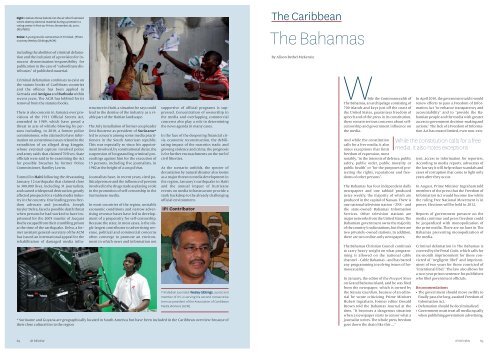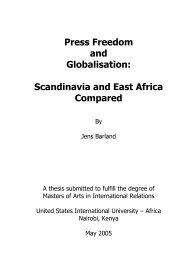FOCUS ON THE AMERICAS - International Press Institute
FOCUS ON THE AMERICAS - International Press Institute
FOCUS ON THE AMERICAS - International Press Institute
Create successful ePaper yourself
Turn your PDF publications into a flip-book with our unique Google optimized e-Paper software.
Right: Haitians throw ballots into the air after frustrated<br />
voters destroy electoral material during a protest in a<br />
voting center in Port-au-Prince, November 28, 2010.<br />
(REUTERS)<br />
Below: A young studio cameraman in Trinidad. (Photo<br />
courtesy Wesley Gibbings/ACM)<br />
including the abolition of criminal defamation<br />
and the inclusion of a provision for innocent<br />
dissemination/responsibility for<br />
publication in the case of “subordinate distributors”<br />
of published material.<br />
Criminal defamation continues to exist on<br />
the statute books of Caribbean countries<br />
and the offence has been applied in<br />
Grenada and Antigua and Barbuda within<br />
recent years. The ACM has lobbied for its<br />
removal from the statutes books.<br />
There is also concern in Jamaica over provisions<br />
of the 1911 Official Secrets Act,<br />
amended in 1989, which have posed a<br />
threat to acts of whistle-blowing by persons<br />
including, in 2010, a former police<br />
commissioner, who claimed to have information<br />
on contentious issues related to the<br />
extradition of an alleged drug kingpin,<br />
whose eventual capture involved police<br />
and army raids that claimed 70 lives. State<br />
officials were said to be examining the Act<br />
for possible breaches by former Police<br />
Commissioner, Hardley Lewin.<br />
Turmoil in Haiti following the devastating<br />
January 12 earthquake that claimed close<br />
to 300,000 lives, including 31 journalists,<br />
and caused widespread destruction, greatly<br />
affected prospects for a viable media industry<br />
in the country. One leading press freedom<br />
advocate and journalist, Joseph<br />
Guyler Delva, faced a possible death threat<br />
when persons he had worked to have imprisoned<br />
for the 2005 murder of Jacques<br />
Roche escaped from their crumbling prison<br />
at the time of the earthquake. Delva, a former<br />
assistant general-secretary of the ACM<br />
has issued an international appeal for the<br />
rehabilitation of damaged media infra-<br />
structure in Haiti, a situation he says could<br />
lead to the demise of the industry as a viable<br />
part of the Haitian landscape.<br />
The July installation of former coup leader<br />
Desi Bouterse as president of Suriname*<br />
led to concern among some media practitioners<br />
in the South American republic.<br />
This was especially so since his appointment<br />
involved, by constitutional dictat, the<br />
suspension of longstanding criminal proceedings<br />
against him for the execution of<br />
15 persons, including five journalists, in<br />
1982 at the height of a coup d’état.<br />
Journalists have, in recent years, cited political<br />
pressure and the influence of persons<br />
involved in the drugs trade as playing a role<br />
in the promotion of self-censorship in the<br />
Surinamese media.<br />
In most countries of the region, unstable<br />
economic conditions and narrow advertising<br />
revenue bases have led to development<br />
of a propensity for self-censorship.<br />
Because the state, in most cases, is the single<br />
largest contributor to advertising revenue,<br />
political and commercial concerns<br />
often converge to promote an environment<br />
in which news and information not<br />
supportive of official programs is suppressed.<br />
Concentration of ownership in<br />
the media and overlapping commercial<br />
concerns also play a role in determining<br />
the news agenda in many cases.<br />
In the face of the deepening financial crisis,<br />
economic reconstruction, the debilitating<br />
impact of the narcotics trade, and<br />
growing violence and crime, the prognosis<br />
is for further encroachments on the turf of<br />
civil liberties.<br />
As the scenario unfolds, the specter of<br />
devastation by natural disaster also looms<br />
as a major threat to media development in<br />
the region. January’s earthquake in Haiti<br />
and the annual impact of hurricane<br />
events on media infrastructure provide a<br />
stark backdrop to the already challenging<br />
official environment.<br />
IPI Contributor<br />
Trinidadian journalist Wesley Gibbings, a poet and<br />
member of IPI, is serving his second consecutive<br />
term as president of the Association of Caribbean<br />
Media Workers (ACM).<br />
* Suriname and Guyana are geographically located in South America but have been included in the Caribbean overview because of<br />
their close cultural ties to the region<br />
The Caribbean<br />
The Bahamas<br />
By Alison Bethel McKenzie<br />
While the Commonwealth of<br />
The Bahamas, an archipelago consisting of<br />
700 islands and keys just off the coast of<br />
the United States, guarantees freedom of<br />
speech and of the press in its constitution,<br />
there remain serious concerns about selfcensorship<br />
and government influence on<br />
the media.<br />
And while the constitution<br />
calls for a free media, it also<br />
notes exceptions that limit<br />
freedom of expression, most<br />
notably, “in the interests of defence, public<br />
safety, public order, public morality or<br />
public health” or “for the purposes of protecting<br />
the rights, reputations and freedoms<br />
of other persons”.<br />
The Bahamas has four independent daily<br />
newspapers and one tabloid produced<br />
twice weekly, the majority of which are<br />
produced in the capital of Nassau. There is<br />
one national television station – ZNS – and<br />
the state-owned Bahamas Information<br />
Services. Other television stations are<br />
major networks from the United States. The<br />
Bahamian government owns the majority<br />
of the country’s radio stations, but there are<br />
two privately-owned stations. In addition,<br />
there are two online-only newspapers.<br />
The Bahamas Christian Council continues<br />
to carry heavy weight on what programming<br />
is allowed on the national cable<br />
channel – Cable Bahamas - and has barred<br />
any programming involving issues of homosexuality.<br />
In January, the editor of the Freeport News<br />
on Grand Bahama Island, said he was fired<br />
from the newspaper, which is owned by<br />
the Nassau Guardian, because of an editorial<br />
he wrote criticizing Prime Minister<br />
Hubert Ingraham. Former editor Oswald<br />
Brown told the Bahamas Journal at the<br />
time, “It becomes a dangerous situation<br />
when a newspaper starts to censor what a<br />
journalist writes. The whole press freedom<br />
goes down the drain like this …”<br />
In April 2010, the government said it would<br />
renew efforts to pass a Freedom of Information<br />
Act “to enhance transparency and<br />
accountability” and to “provide the Bahamian<br />
people and the media with greater<br />
access to government decision-making and<br />
actions.” The lack of a Freedom of Information<br />
Act has meant limited, even non-exis-<br />
While the constitution calls for a free<br />
media, it also notes exceptions.<br />
tent, access to information for reporters.<br />
According to media reports, advocates of<br />
the law say it will help reduce scandals and<br />
cases of corruption that come to light only<br />
years after they occur.<br />
In August, Prime Minister Ingraham told<br />
members of the press that the Freedom of<br />
Information Act would become law while<br />
the ruling Free National Movement is in<br />
power. Elections will be held in 2012.<br />
Reports of government pressure on the<br />
media continue and press freedom could<br />
be jeopardized with monopolization of<br />
the print media. There are no laws in The<br />
Bahamas preventing monopolization of<br />
the media.<br />
Criminal defamation in The Bahamas is<br />
covered by the Penal Code, which calls for<br />
six-month imprisonment for those convicted<br />
of “negligent libel” and imprisonment<br />
of two years for those convicted of<br />
“intentional libel.” The law also allows for<br />
a two-year prison sentence for publishers<br />
who libel government officials.<br />
Recommendations<br />
• The government should move swiftly to<br />
finally pass the long-awaited Freedom of<br />
Information Act.<br />
• Defamation should be decriminalized.<br />
• Government must treat all media equally<br />
when publishing government advertising.<br />
84 IPI REVIEW<br />
IPI REVIEW 85

















